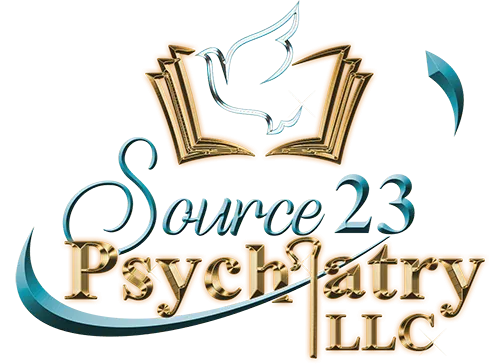First Steps to Getting Help for an Eating Disorder
Many people struggle with eating disorders, which can significantly impact your health. If you or someone you know is struggling, keep reading to discover the first steps in seeking help for an eating disorder.
Eating disorders are dangerous mental health conditions that lead to consuming minimal calories or binging and purging your food. These conditions severely affect your health if you don't recognize the problem and seek help.
The Source 23 Psychiatry team understands how hard it is to ask for help when you have an eating disorder. Kimberly Gilbert, MSN, APRN, PMHNP-BC, has experience treating several eating disorders. Ms. Gilbert helps you recognize the signs and understand when you need help before your eating disorder consumes your life.
What are eating disorders?
Eating disorders are a group of conditions that cause you to struggle with how much you eat as well as your relationship with food. These conditions also affect your mental and physical health over time.
When you have an eating disorder, you're obsessed with your weight and how much food goes into and out of your body. There are several types of eating disorders, including:
Anorexia nervosa
This eating disorder is characterized by extreme weight loss caused by intense exercise and extreme dieting. Even with significant weight loss, you may feel fat and undesirable.
Bulimia nervosa
Bulimia is also characterized by extreme weight loss. Still, instead of starvation, you tend to binge eat and vomit to get rid of the food you just ate. You may feel like you've lost control when it comes to eating.
Lastly, the third type of eating disorder is binge eating disorder. When you have this condition, you experience regular episodes of binge eating and have no control over the problem.
Recognizing the signs
Whether you're suffering from an eating disorder or suspect a loved one is going through it, you must keep an eye out for the signs. Recognizing the signs and symptoms of eating disorders allows you to seek early help.
Each type of eating disorder has its own set of symptoms, and the most common signs of anorexia and bulimia include the following:
- Exercising excessively
- Frequent bathroom trips after eating
- Skipping meals or avoiding eating altogether
- Wearing baggy clothing to hide weight loss
- Scarred knuckles from vomiting
- Constantly complaining about being fat
- Refusal to eat certain types of foods
- Excessive preoccupation with counting calories
Someone with an eating disorder may prepare a nice meal for everyone else but refuse to eat it themselves. There's often a noticeable issue with food if you have an eating disorder.
How to get help for eating disorders
Recognizing you have a problematic relationship with food and your weight is the first step in getting help for your eating disorder. If you're unsure what to do next, there are a few things you can do to make your transition into treatment easier, including:
Admit there's a problem
The first step in recovery from an eating disorder is realizing you have a problem. It's easy to deny that you have a problem and want to lose weight to make yourself happy.
However, if you're going to extreme measures to achieve weight loss and it's affecting your health, you need to come to terms with the fact that you have an eating disorder and need help.
Ask for help
The second step in recovery from an eating disorder is realizing you can't go at it alone. You must seek help not only from Ms. Gilbert but also from your friends and family. Having a solid support group is the key to your success.
Don't beat yourself up
It's easy to feel guilty or unworthy of help; however, you need to be strong and realize that you're good enough to receive the help you need. Try not to dwell on the past, and take one day at a time during your recovery.
Understand your feelings
When you finally ask for help with an eating disorder, a whirlwind of emotions is likely bound to follow. Ms. Gilbert helps you understand your feelings to allow you to cope with your emotions.
Be patient
Another step in recovery is realizing you won't get better overnight. Overcoming your eating disorder will take time, work, and dedication. Although you might want to quit, patience is the best way to ensure success.
To get expert care for an eating disorder, don't hesitate to call Source 23 Psychiatry at 614-908-2721 to schedule your virtual or telehealth appointment today. You can also request your virtual appointment on the website.
Psychiatry & Telehealth located in Virtual Office, Columbus, OH
Source 23 Psychiatry, LLC
4449 Easton Way, Suite 200,
Columbus, OH 43219
Hours of Operation
Source 23 Psychiatry, LLC
Monday
9:00 am - 6:30 pm
Tuesday
9:00 am - 6:30 pm
Wednesday
9:00 am - 6:30 pm
Thursday
9:00 am - 3:00 pm
Friday
Closed
Saturday
10:00 am - 3:00 pm
Sunday
Closed
PSALM 23: 1-6
1 The Lord is my shepherd; I shall not want.
2 He maketh me to lie down in green pastures: he leadeth me beside the still waters.
3 He restoreth my soul: he leadeth me in the paths of righteousness for his name’s sake.
4 Yea, though I walk through the valley of the shadow of death, I will fear no evil: for thou art with me; thy rod and thy staff they comfort me.
5 Thou preparest a table before me in the presence of mine enemies: thou anointest my head with oil; my cup runneth over.6 Surely goodness and mercy shall follow me all the days of my life: and I will dwell in the house of the Lord for ever.

